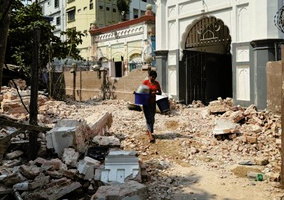The Disasters Emergency Committee (DEC) is considering adopting a model whereby more of its core work is funded privately, reducing the need to charge these costs to its appeals.
DEC’s core costs are covered by contributions from its 15 member charities, grants and gift aid raised in appeals and legacy income, while appeal-specific costs are charged to their related appeals.
In its latest accounts, the charity said it operates “a highly efficient model, keeping costs to a minimum”, with its annual costs covering its core team and maintenance of infrastructure, “which is needed year-round to ensure we’re always ready to launch appeals”.
“Over this strategic period, we’re seeking to move towards a model whereby more of the operational work of the DEC Secretariat is funded privately, minimising the need to charge these costs to DEC appeals,” its accounts read.
Meanwhile, its accounts show that its total income, including gift aid and bank interest, rose by £17.9m to £50.8m last year, largely due to the ongoing Middle East Humanitarian Appeal.
Evolving organisational core costs model
DEC said it intends to evolve its current approach to organisational financing and risk to create “a more sustainable organisation better able to withstand future unpredictability and meet regulatory and compliance requirements”.
This will include evolving its organisational core costs model, revising its reserves policy, investing in financial budgeting, monitoring and reporting and establishing a new risk and compliance framework.
Accounts for the year ending 31 March 2025 show that DEC has already begun targeting fundraising specifically for its core costs, raising £0.3m during the year under review.
“We started scoping for a new reserves policy which will reflect the risks and opportunities going forward and we also invested in our accounting system, moving fully to the cloud,” its accounts say.
“We plan to improve the accounting processes around our core cost fundraising, ensuring that our systems are effective and efficient.
“We’ll create a roadmap for developing a new accounting system, which will enable the accounting team to focus on bringing value to the charity rather than transactional processing.”
DEC added that it will revise its reserves policy, “delivering a risk-based approach and ensuring that reserve levels are dynamically managed”.
£2.5bn raised in 61 years
Since it began operating in 1963, DEC has raised £2.5bn across 79 emergency appeals.
Between April 2024 and March 2025, DEC raised £50.8m through its appeals (2023-24: £32.9m) and distributed £54.6m to its 15 member charities for humanitarian response.
In October 2024, the charity launched the Middle East Humanitarian Appeal, which is match-funded by the UK government up to the value of £10m, to provide support to people affected by the ongoing conflict in the Middle East.
The appeal raised £8.8m after the first 24 hours and £20m in just over a week and has raised over £47m since then.
DEC said the appeal “has been one of the most complex and challenging” for it and its member charities due to the blocks to humanitarian access, continued airstrikes, and restrictions on movement and political sensitivities.
The appeal brought in a total income of £34.9m last year, thus accounting for the majority of its overall £50.8m income.
Other appeals
During the year under review, DEC closed its Türkiye-Syria Earthquake Appeal for donations and ended its response in Pakistan.
Launched on 9 February 2023, the Türkiye-Syria Earthquake Appeal became one of DEC’s largest-ever appeals, raising £163.8m including £5m matched by the UK government.
DEC launched the Pakistan Floods Appeal on 1 September 2022, which raised £50.1m including £5m matched by the UK Government.
In January of this year, DEC closed its Ukraine Humanitarian Appeal, launched on 3 March 2022 following Russia’s invasion.
The charity said this appeal “would go on to become one of the largest and longest-running appeals in our history”, raising over £446m, including £25m matched by the UK government.
While DEC’s funded programmes conclude this month, “some DEC member charities and their partners will continue to conduct activities based on the current needs of vulnerable communities, adapting interventions as needs develop and providing as much holistic support for affected communities as possible”, DEC said.
“This work, however, is now taking place in the context of limited funding for humanitarian assistance more broadly, both in Ukraine and neighbouring countries.
“Therefore, DEC member charities and their local partners will continue to strategically support the most vulnerable people affected by the crisis, while also working with local organisations to support them in being able to continue helping those in need.”
DEC added that international non-governmental organisations, including its member charities, are having to scale back their presence and service delivery in the region due to declining resources and funding.
Following an earthquake in Myanmar on 28 March 2025, DEC launched the Myanmar Earthquake Appeal on 3 April, which has raised over £26m so far.
Related articles











